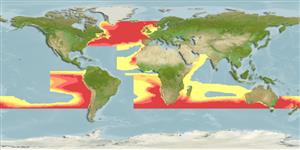Teleostei (teleosts) >
Beryciformes (Sawbellies) >
Melamphaidae (Bigscale fishes or ridgeheads)
Etymology: Scopelogadus: Greek, skopelos = a lantern fish + Latin, gadus = a fish; cod? (Ref. 45335).
More on author: Günther.
Environment: milieu / climate zone / depth range / distribution range
Ecology
Marine; bathypelagic; depth range 0 - 2500 m (Ref. 9731). Deep-water; 65°N - 40°S
Southwest Pacific: New South Wales, Australia (Ref. 7300) and New Zealand (Ref. 5755). Southeast Pacific: Chile (Ref. 9068). Also in the Atlantic and southern Indian Oceans.
Size / Weight / Age
Maturity: Lm ? range ? - ? cm
Max length : 12.2 cm SL (female)
One of the largest and deepest-dwelling melamphid species. Feeds mainly on pelagic prey. Captured by bottom and midwater trawls (Ref. 26478). Minimum depth from Ref. 58018.
Life cycle and mating behavior
Maturities | Reproduction | Spawnings | Egg(s) | Fecundities | Larvae
Maul, G.E., 1990. Melamphaidae. p. 612-618. In J.C. Quero, J.C. Hureau, C. Karrer, A. Post and L. Saldanha (eds.) Check-list of the fishes of the eastern tropical Atlantic (CLOFETA). JNICT, Lisbon; SEI, Paris; and UNESCO, Paris. Vol. 2. (Ref. 4502)
IUCN Red List Status (Ref. 130435)
Threat to humans
Harmless
Human uses
Fisheries: of no interest
Tools
Special reports
Download XML
Internet sources
Estimates based on models
Preferred temperature (Ref.
123201): 2.7 - 11.3, mean 7.1 °C (based on 510 cells).
Phylogenetic diversity index (Ref.
82804): PD
50 = 0.5625 [Uniqueness, from 0.5 = low to 2.0 = high].
Bayesian length-weight: a=0.01096 (0.00451 - 0.02668), b=3.10 (2.89 - 3.31), in cm total length, based on LWR estimates for this (Sub)family-body shape (Ref.
93245).
Trophic level (Ref.
69278): 3.9 ±0.3 se; based on diet studies.
Resilience (Ref.
120179): Medium, minimum population doubling time 1.4 - 4.4 years (Assuming tm=2-4).
Fishing Vulnerability (Ref.
59153): Low vulnerability (10 of 100).
Nutrients (Ref.
124155): Calcium = 34.5 [13.1, 141.8] mg/100g; Iron = 0.386 [0.137, 1.251] mg/100g; Protein = 2.82 [0.00, 6.79] %; Omega3 = 0.283 [0.079, 0.959] g/100g; Selenium = 7.55 [2.25, 30.78] μg/100g; VitaminA = 119 [15, 1,103] μg/100g; Zinc = 0.745 [0.387, 1.553] mg/100g (wet weight);
